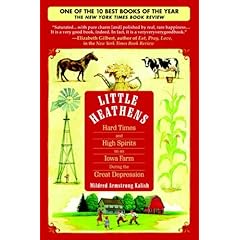
I know I shouldn't let it worry me BUT, the economy and recession have had me worried. The cost of crude oil has had an impact on everything here and the housing problems due to bad financing choices are a worry! So I was interested to run into a memoir called Little Heathens : Hard Times and High Spirits on an Iowa Farm During the Great Depression by Mildred Armstrong Kalish. I remember my grandmother talking about all the Chicago relatives that turned up on their rural Wisconsin farm because at least there was food on the farm. And they would TRY to help, even though they were unused to that kind of manual labor. And my mother talks about the rationing of gas during WWII when they rode the farm horses into town if they wanted to go to a movie or dance! This all makes me think that we can get through the hard times but may need to tighten our belts for a while! We don't have any idea what real hunger is like-the oil problem is not only impacting us. People in Africa really are starving...
Here is what the New York Times said about Little Heathens:
That Mildred’s father’s name was never again spoken in her presence is not remarkable, given the time and place. Rural, Methodist Iowans during the Great Depression were not a soft lot; when folks got unforgiven back then, they stayed unforgiven. What is remarkable, however, is that Mildred’s shamed father — after being mentioned briefly in Chapter 1 of her lovely memoir, “Little Heathens” — is never spoken of again for the entire duration of this book.
Now that, I must say, flies in the face of all current literary convention. No self-respecting modern memoirist (myself included!) would ever abandon such a juicy bit of suffering as a banished father. Surely one could milk volumes of pain (and book deals) from such misfortune! But Kalish — while publishing in 2007 — still holds the values of 1935, when people coped quite differently with their sorrows. After her father disappeared, Mildred and her mother and siblings simply moved on — emotionally and literally. And they moved in with those strict Iowan grandparents (two rigid souls who “never completely made it into the 20th century”) which is where young Mildred’s story really commences — on a farm where “a family of five was now the responsibility of two old people,” and the business of instilling character in the young ones began in earnest.
Some of what follows is unsurprising. You’ll never guess it, but these kids were taught to work. They planted potatoes, tended livestock, hayed fields and were beaten for any lapses in judgment. They did without luxuries (electricity, leisure, heat) and were never coddled on account of their tender youth. (“Childhood was generally considered to be a disease,” Kalish recalls, “or, at the very least, a disability, to be ignored for the most part, and remedied as quickly as possible.”)
For anyone from an old-school farming background, this is familiar territory. “We were taught that if you bought something it should last forever — or as close to forever as we could contrive,” Kalish reports predictably. Or: “When one of us kids received a scratch, cut or puncture, we didn’t run to the house to be taken care of.” If all that “Little Heathens” offered, then, were more such hard-times homilies, this would not be much of a book. But this memoir is richer than that, filled with fervency, urgency and one amazing twist, which surprised me to the point of a delighted, audible gasp: Mildred Armstrong Kalish absolutely loved her childhood.
It’s not merely that she appreciated the values instilled by the Great Depression, or that now, in her older years, she wants to preserve memories of a lost time (though all this is true). No — beyond that, she reports quite convincingly that she had a flat-out ball growing up (“It was quite a romp”) and her terrifically soaring love for those childhood memories saturates this book with pure charm, while coaxing the reader into the most unexpected series of sensations: joy, affection, wonder and even envy.
It’s a rare thing, indeed, for any human to feel she was truly the luckiest of all mortals to have been raised exactly when and where she was. But how did young Mildred — a homely, chubby, fatherless kid, reared on a hardscrabble Iowa farm during the Great Depression by a melancholy mother and regimented grandparents who referred to their shamed daughter’s children as “spawn” — how did such a seemingly unlucky little being manage to work up the genius to relish every minute of her life?
I think maybe it had something to do with all that sky. Having lived a disproportionate sum of her childhood outdoors, Kalish was greatly overexposed to “the high blue sky” of Iowa and all that blue oxygen and soaring heavenly vaulting seems to have made her a little intoxicated. But she was also dosed by more than her share of barefoot expeditions over “the astonishingly thick green grass that carpets the woods in Iowa.” She gets almost woozy remembering the sight and scent of the “giant pink bouquet” that arrived every spring when the farm’s one crab apple tree climaxed into bloom. And Kalish swears that the privilege of inhaling “the sweet fragrance emanating from the clean body of a colt, calf, lamb, puppy or kitten that had been sleeping on the grass and warmed by the sun” is one of life’s great “pagan pleasures.”
There is more to the review but I think you get the picture! Really good read, no?
Talk to you later,
Lynda
You know you're getting old when you stoop to tie your shoelaces and wonder what else you could do while you're down there. - George Burns
No comments:
Post a Comment